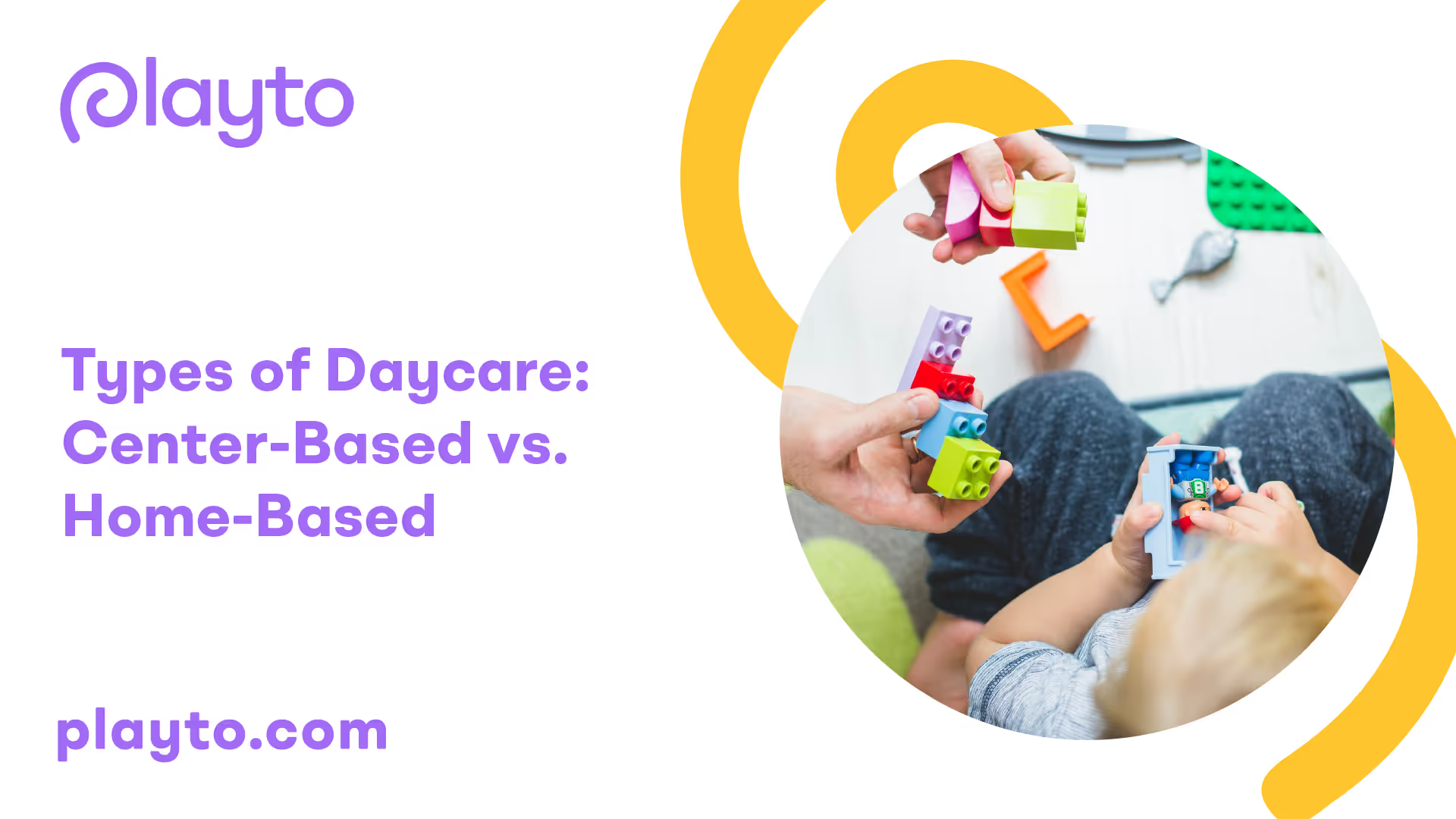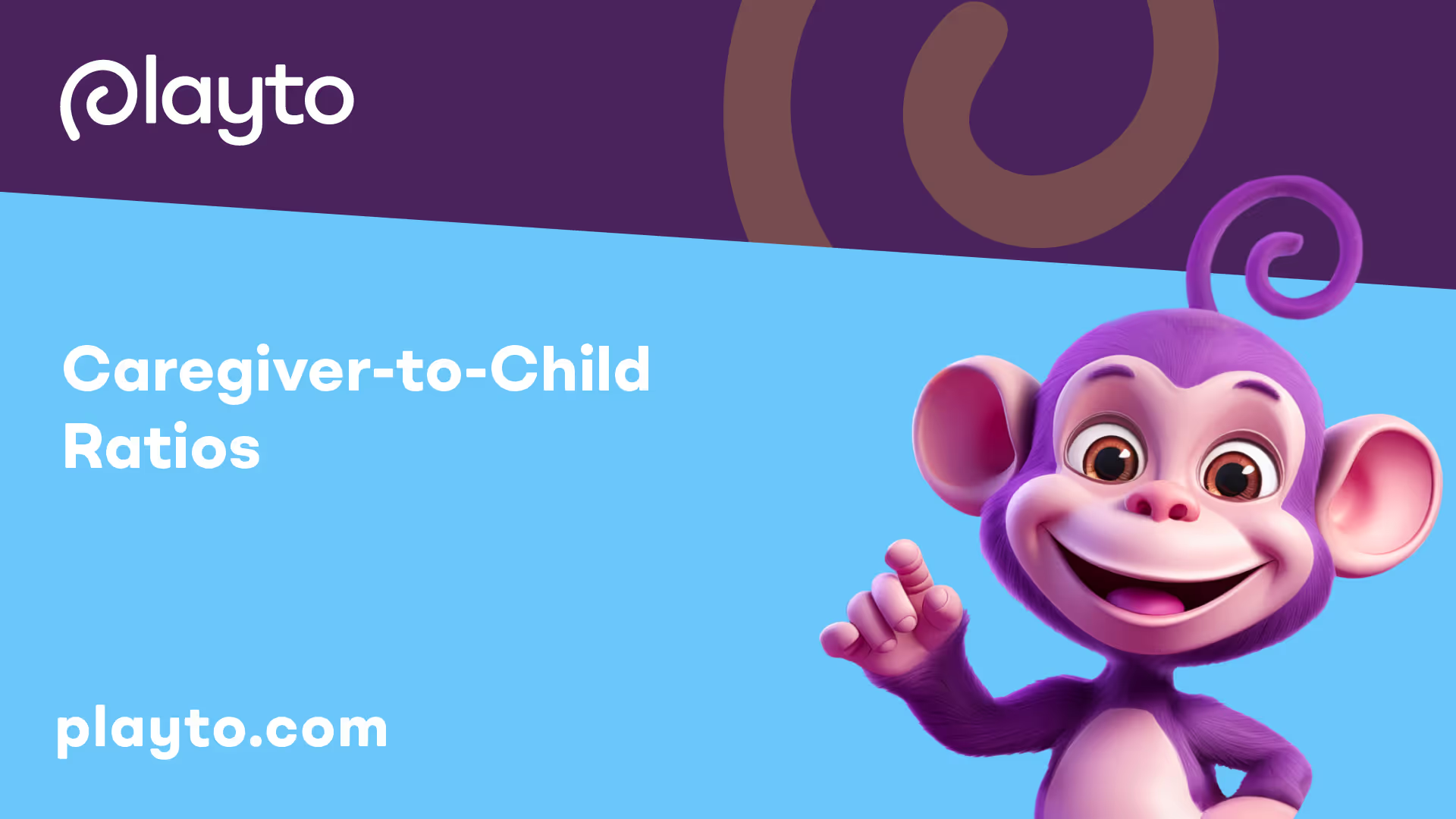Types of Daycare Settings
When it comes to choosing the right daycare for your child, it's important to understand the different types of daycare settings available. The two primary types are center-based daycare and home-based daycare.

Center-Based Daycare Overview
Center-based daycare, also known as daycare centers or preschools, refers to childcare programs where children attend facilities outside of a home setting. These centers are usually larger and offer more structured environments for children to learn and play. They often have dedicated classrooms and larger playgrounds to accommodate multiple age groups. Center-based daycare facilities can provide a wide range of services, including early education, socialization opportunities, and age-appropriate activities.
One of the advantages of center-based daycare is the presence of qualified caregivers who undergo training and certifications. These caregivers may specialize in early childhood education, ensuring that children receive age-appropriate learning experiences. Additionally, daycare centers often have set operating hours that align with the typical workday, providing flexibility for working parents. For more information on the benefits of daycare for child development, check out our article on benefits of daycare for child development.
Home-Based Daycare Overview
Home-based daycare, as the name suggests, occurs within the caregiver's home or another private space. This type of daycare offers a more intimate environment, with a smaller group of children. Home-based daycare providers often care for children of different ages simultaneously, creating a family-like setting. The caregiver may have their own children present, allowing for a multi-age group dynamic.
Home-based daycare providers may not require the same level of formal training as center-based daycare centers, but they still play a crucial role in nurturing and caring for children. The smaller group size can provide a more personalized approach to childcare, with opportunities for one-on-one interaction. Home-based daycare settings may offer more flexibility in terms of hours, allowing for individual arrangements with parents. For guidance on choosing the right daycare for your child, refer to our article on how to choose the right daycare for your child.
When deciding between center-based and home-based daycare, it's important to consider factors such as your child's needs, your work schedule, and your personal preferences. Each type of daycare setting has its own advantages and considerations. Understanding the differences between center-based and home-based daycare can help you make an informed decision that best suits your child and family's needs.
For more information on daycare licensing and regulations, visit our article on understanding daycare licensing and regulations.
Licensing and Regulation
When considering daycare options, it's important to understand the licensing and regulatory requirements that govern different types of daycare settings. This section will discuss the licensing requirements for daycare centers and the licensing exemptions for home-based daycare.

Licensing Requirements for Daycare Centers
Daycare centers are licensed child care providers that operate out of a facility, which may be privately owned or operated by a non-profit organization. Licensing requirements for daycare centers vary by state and are designed to ensure the safety and well-being of children in their care.
Some states and territories have specific regulations and licensing requirements for daycare centers, including staff qualifications, health and safety standards, caregiver-to-child ratios, and more. However, it's important to note that certain center-based child care programs may be exempt from licensure in some states. This occurs when these programs are already regulated by a government agency that differs from the agency overseeing child care licensing.
To determine the specific licensing requirements for daycare centers in your state, it is recommended to visit the website of your local state government or the appropriate licensing agency.
Licensing Exemptions for Home-Based Daycare
In contrast to daycare centers, home-based daycares are typically operated by individuals in their own homes. The licensing requirements for home-based daycares can vary by state and may not always be required. Some states may not require certain in-home child care programs to have a license if they meet specific criteria, such as caring for only a limited number of children or operating for a certain number of hours per day.
It is important to understand that while some in-home daycare programs may be legally exempt from needing a child care license, there is a distinction between these programs and those that operate without a license, which is illegal. Licensed and/or accredited daycare providers are generally recommended for parents, whenever possible, to ensure compliance with safety and quality standards.
To determine the licensing requirements for in-home daycares in your state, it is advisable to review the information provided on your local state government website.
By understanding the licensing and regulatory landscape for daycare centers and home-based daycares, parents can make informed decisions when choosing the best option for their child's care. It is important to prioritize the safety, quality, and compliance with regulations when selecting a daycare provider. For more information on choosing the right daycare for your child, refer to our article on how to choose the right daycare for your child.
Caregiver-to-Child Ratios
One of the key considerations when choosing between center-based and home-based daycare is the caregiver-to-child ratio. This ratio is important as it determines the amount of individual attention and supervision each child receives. Let's take a closer look at the staff-to-child ratios in daycare centers and home-based daycare settings.

Staff-to-Child Ratios in Daycare Centers
Daycare centers are typically required to adhere to specific staff-to-child ratios set by state regulations. These ratios are established to ensure the safety, well-being, and development of children in daycare settings [2]. While the exact ratios may vary depending on the state and the age group of children, the following table provides a general overview:

These ratios ensure that children in daycare centers receive sufficient one-on-one attention from their caregivers, particularly for younger children who require more personalized care and supervision. The low staff-to-child ratios and small group sizes in daycare centers help create a nurturing environment for children to thrive [2].
Ratios in Home-Based Daycare
In home-based daycare settings, the caregiver-to-child ratios may differ from those in daycare centers. Family child care home programs typically include the provider's own children under the age of 6, as well as any other children in the home requiring supervision. The staff-to-child ratio in family child care home programs with mixed-age groups, including infants and toddlers, is generally recommended to be 1:6, with specific restrictions on the number of children 24 months or younger.
It's important to note that the staff-to-child ratio and group size requirements can vary by state and the type of program. Early childhood experts provide recommendations for safe ratios and group sizes in daycare settings, ensuring the well-being and proper care of children. It's advisable to research the specific regulations and guidelines set by your state when considering home-based daycare options.
Understanding the caregiver-to-child ratios in both center-based and home-based daycare settings helps parents make informed decisions about the quality of care their child will receive. By considering these ratios along with other factors such as licensing, cost, and the setting environment, parents can choose the option that best meets their child's needs and provides a safe and nurturing environment while they are away. For more information on choosing the right daycare for your child, take a look at our article on how to choose the right daycare for your child.
Setting and Environment
When considering the different types of daycare settings, it's important to evaluate the setting and environment provided by both center-based daycares and home-based daycares. These factors play a significant role in the overall experience and care provided to children.
Facilities of Center-Based Daycares
Center-based daycares, such as school programs, summer camps, faith-based programs, nursery schools, preschools, and pre-K programs, typically have larger facilities compared to home-based daycares. This allows them to accommodate more children and provide a variety of resources and equipment for learning and play.
The facilities in a daycare center are designed to support children's development and provide an engaging and stimulating environment. They often have designated areas for different activities, such as play areas, learning centers, and outdoor spaces. These centers usually have a structured curriculum that focuses on early childhood education and development. The larger space also allows for more social interaction among children, fostering their social and emotional growth.
Environment of Home-Based Daycares
Home-based daycares, on the other hand, operate in a home-like environment. They are typically smaller in scale and have a more intimate setting. Home-based daycares can provide a nurturing and homely atmosphere, which may be comforting for young children.
While home-based daycares may have fewer resources and equipment compared to center-based daycares, they often have a more flexible and personalized approach to care. The smaller group size allows for more one-on-one attention from the caregiver, fostering closer relationships between the caregiver and the children. This can create a sense of security and familiarity for the children in the home-based daycare setting.
When choosing between center-based and home-based daycares, it's important to consider the specific needs and preferences of your child. Some children thrive in the structured and social environment of a daycare center, while others may feel more comfortable in the cozy and personalized atmosphere of a home-based daycare.
Ultimately, the setting and environment of a daycare play a significant role in shaping a child's experience. It's important to visit and assess different daycare options, taking into account factors such as safety, cleanliness, and the overall feel of the environment. By understanding the facilities and environment offered by each type of daycare, parents can make an informed decision that best suits the needs of their child.
For more information on choosing the right daycare for your child, check out our article on how to choose the right daycare for your child.
Cost and Affordability
When it comes to choosing between center-based and home-based daycare options, cost is an important factor to consider. Let's take a closer look at the cost considerations for daycare centers and the affordability of home-based daycare.
Cost Considerations for Daycare Centers
Daycare centers, which are operated out of licensed facilities, often come with a higher price tag compared to home-based daycare options. The cost of daycare centers can vary depending on factors such as location, the age of the child, and the services provided.
According to Wonderschool, daycare centers generally have higher tuition rates compared to home-based daycare, as they have more overhead costs to cover, including rent, utilities, and additional staff. It's important to consider these factors when budgeting for daycare expenses.
In addition to tuition, parents should also inquire about any additional fees that may be associated with daycare centers, such as registration fees, supply fees, or activity fees. It's essential to have a clear understanding of the total cost of enrollment to avoid any surprises down the line.
Affordability of Home-Based Daycare
Home-based daycare options, on the other hand, tend to be more affordable for parents. According to Wonderschool, in-home daycare tuition rates are approximately 30% more affordable than center-based child care. This affordability is due to the fact that home-based providers typically operate with fewer overhead costs.
It's important to note that the cost of home-based daycare can still vary depending on factors such as the provider's qualifications, the location, and the services offered. Additionally, parents should consider any potential cost increases or meal inclusions when comparing the affordability of home-based daycare options.
While home-based daycare may be more affordable, it's essential to consider other factors when making a decision. Home-based daycare often offers a more personalized experience due to smaller group sizes, allowing for more individual attention and a closer bond with the caregiver. However, children in home-based daycare may have less exposure to different teachers and peers compared to center-based care, as mentioned by Wonderschool.
Regardless of the type of daycare chosen, it's recommended to thoroughly research and visit potential providers to ensure that they meet licensing requirements and offer a safe and nurturing environment for your child. For more information on understanding daycare licensing and regulations, you can refer to our article on understanding daycare licensing and regulations.
By considering the cost and affordability of daycare options, parents can make an informed decision that aligns with their budget while also prioritizing their child's well-being and development.
Choosing the Best Option
When it comes to selecting the best daycare option for your child, there are several factors to consider. Both center-based and home-based daycares have their own advantages and considerations. Taking these factors into account will help you make an informed decision that aligns with your child's needs and your family's preferences.
Factors to Consider
Personalization and Socialization
In-home daycare offers a more personalized experience due to smaller group sizes, allowing for more individual attention and a closer bond with the caregiver. It can provide a setting that bridges home and school life. On the other hand, children in in-home daycare may have less exposure to different teachers and peers compared to center-based care [4].
Childcare centers usually separate children into age groups, providing age-appropriate activities and social interactions. This structured environment can help prepare children for the transition to kindergarten. They offer opportunities for children to interact with a larger peer group and engage in group activities, contributing to socialization and the development of important social skills [5].
Curriculum and Educational Opportunities
Childcare centers may be more likely to have a formal curriculum compared to home daycares. While some home daycares have curricula similar to center-based preschools, others may not have formal curricula but incorporate various social-emotional and academic activities. Consider the importance of a structured curriculum and educational opportunities when making your decision.
Cost and Convenience
Cost and convenience are also important considerations. Childcare centers often have more fixed operating hours, making them suitable for parents with regular work schedules. In-home daycares may offer more flexible hours and are often located within residential areas, which can be convenient for families living nearby. Evaluate the cost and convenience of each option in relation to your family's needs and budget.
Making an Informed Decision
To make an informed decision, it's crucial to thoroughly research and visit potential daycare options. Take the time to assess the quality of care, educational opportunities, and the overall environment. Consider the long-term financial impact and weigh it against the benefits and considerations of each type of daycare. Remember to check the licensing and regulations for both center-based and home-based daycares in your area. Understanding the laws and regulations will help ensure the daycare you choose meets the required standards of safety and quality [6].
By carefully considering these factors, you can determine which type of daycare, whether center-based or home-based, aligns best with your child's needs and your family's values. Making the right choice will provide your child with a safe, nurturing environment that supports their growth and development.
